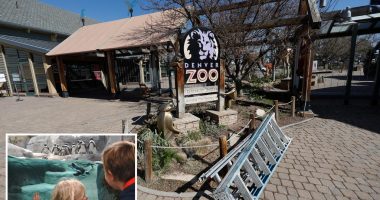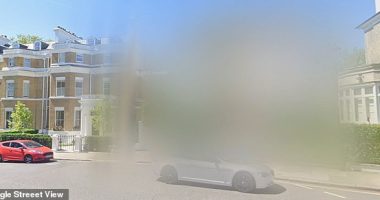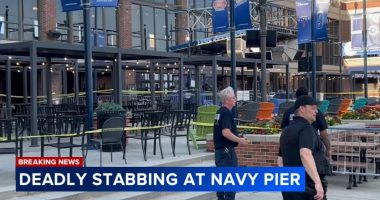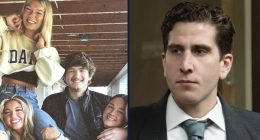Israel claimed it had struck Hezbollah’s central headquarters under residential buildings in Beirut this afternoon after Prime Minister Benjamin Netanyahu vowed to continue the fight against the ‘terror organisation’.
Huge clouds of smoke towered over Beirut this afternoon following the heaviest attack on the capital in nearly a year of conflict. Residents said they heard multiple blasts from Israeli ‘shelling’, according to journalist Mounir Rabih, on the ground.
Unconfirmed reports suggest that Hezbollah leader Hassan Nasrallah was the target of the attack. The IDF did not mention whether Nasrallah was a target or believed to be present. Israel was later reported to be ‘checking’ if he was present, sources told Israeli media.
Hezbollah’s Al-Manar TV reported that Israeli strikes had destroyed four buildings in the southern suburbs of Beirut, causing many casualties. The IDF subsequently confirmed it had attacked Hezbollah in Da’aheh, Beirut on its social media pages.
‘As of this time, there is no change in the directives of the Home Front Command. We will update any changes immediately on the official platforms of the Home Front Command,’ it said.
Reports of attacks came minutes after Israeli Prime Minister Benjamin Netanyahu gave a defiant speech at the UN General Assembly, vowing to continue striking Hezbollah in Lebanon until Israel achieves ‘total victory’.

Residents said they heard multiple blasts on Friday, believed to be from Israeli ‘shelling’

Huge clouds of smoke towered over Beirut this afternoon

Netanyahu said he had not intended to come to New York to address the UN assembly this year, but felt compelled to do so ‘to set the record straight’

Israel’s Prime Minister Benjamin Netanyahu addresses the 79th United Nations General Assembly at U.N. headquarters in New York, U.S., September 27, 2024

Pallbearers carry the coffin of Mohammad Surur, head of one of Hezbollah’s air force units who was killed in Israel’s strike on Beirut’s southern suburbs on Thursday

A rescue worker runs amid the rubble of a building destroyed in an Israeli air strike in the Haret Hreik neighbourhood of Beirut’s southern suburbs

A rescuer fights the blaze amid the smouldering rubble of a building destroyed in an Israeli air strike in the Haret Hreik neighbourhood of Beirut

People and a fire truck rush to the scene of an Israeli air strike in Haret Hreik today

Unconfirmed reports suggest that Hezbollah leader Hassan Nasrallah was the target of the attack

Smoke rises from Israeli airstrikes in Beirut, seen from Baabda
As strikes rocked Beirut, sources told Al Arabiya that they were intended for Hassan Nasrallah.
FOX News’ Trey Yingst also reported that Nasrallah had been targeted, but said it was ‘unclear’ if the strike was successful.
Security sources told Reuters that the attack was the the heaviest in the past year, aimed at an area where top Hezbollah officials are usually based.
Al Jazeera’s Zeina Khodr, reporting from Beirut, said: ‘These were not the precision strikes we got used to over the recent days and weeks. This was different.
‘These were unprecedented, multiple, loud and successive explosions – really the loudest explosions that we have heard in the capital.’
Thousands of people were reportedly massed in the area for the funeral of Hezbollah members killed in prior strikes.
IDF spokesperson Daniel Hagari said the command centre was embedded deep within civilian areas.
Ten teams from Lebanon’s Red Cross were immediately dispatched to the scene.
‘The UN is watching with great alarm,’ UN spokesman Stephane Dujarric told a briefing upon news of the attack.
The strikes came shortly after Netanyahu vowed to continue the fight against Hezbollah in his UN General Assembly address, insisting: ‘My country is at war, fighting for its life.’
‘We must defend ourselves against these savage murderers. Our enemies seek not only to destroy us, they seek to destroy our common civilization and return all of us to a dark age of tyranny and terror,’ he told delegates.
In a message he addressed to ‘the tyrants of Tehran’, he said: ‘If you strike us, we will strike you… There is no place in Iran where the long arm of Israel cannot reach. And that is true for the entire Middle East.’
His speech made no mention at all of the 21-day ceasefire proposal made by the US, France and other allies on Wednesday, which seeks to cool tensions and allow space for talks, as the region appears to be on the brink of all-out war.
Israeli Foreign Minister Israel Katz previous rejected the push, vowing to keep fighting Hezbollah militants ‘until victory’. Netanyahu’s office said he had ‘not even responded’ to the proposal, and that he had ordered the military ‘to continue the fighting with full force’.
Hezbollah, for its part, has not commented on the truce proposal.
‘We are winning,’ Netanyahu said triumphantly on Friday, as Israel continues to bombard Lebanon as part of its campaign against Hezbollah, which he labelled a ‘quintessential terror organisation’.
Widespread airstrikes across the country’s south and capital Beirut have left hundreds dead, including civilians, children and paramedics, in just a few days.
Protesters gathered outside the UN condemning Netanyahu, who has vowed to continue with the battle against Hamas until ‘total victory’ is achieved.
He went on to say regarding Israel’s war on Hamas and Hezbollah: ‘We will fight until we achieve victory, total victory, there is no substitute for it.’
His speech was met with cheers from some allies in the audience, but also jeers, with many delegates walking out as he took to the stage.
Netanyahu said he had not intended to come to New York to address the UN assembly this year, but felt compelled to do so ‘to set the record straight’ after what he called ‘the lies and slanders levelled at my country by many of the speakers at this podium.’
He denounced the UN, as he has repeatedly done in the past, labelling it as ‘a house of darkness’ and a ‘swamp of antisemitic bile’ and saying Israel should be treated as fairly as other nations.
He said it the body had passed more resolutions against Israel than all other nations combined over the past decade, adding that the ‘war criminals’ are in Iran, Gaza, Syria and Lebanon.
The two speakers who preceded Netanyahu on Friday each made a point of calling out Israel for its actions in Gaza, where tens of thousands of people have been killed over the past year.

A view shows damage at the site of Israeli strike in Saksakiyeh, southern Lebanon September 27, 2024

Smoke billows over southern Lebanon following an Israeli strike, amid ongoing cross-border hostilities between Hezbollah and Israeli forces, as seen from Tyre, Lebanon September 27, 2024

Anti-war activists rally outside of the hotel where Israeli Prime Minister Netanyahu – who is in the city for the UN General Assembly annual sessions – is staying

Lebanese Red Cross teams conducted search and rescue operations in Nabatieh today

Israel’s Iron Dome anti-missile system intercepts rockets launched from Lebanon towards Israel on Friday

Smoke billows from the site of an Israeli airstrike that targeted southern Lebanese villages, as seen from Marjaayoun, southern Lebanon, 25 September 2024
‘Mr Netanyahu, stop this war now,’ Slovenian Prime Minister Robert Golob said as he closed his remarks, pounding the podium.
Pakistani Prime Minister Shehbaz Sharif, speaking just before the Israeli leader, declared of Gaza: ‘This is not just a conflict. This is systematic slaughter of innocent people of Palestine.’
Israel’s campaign in Gaza has killed more than 41,500 Palestinians and wounded more than 96,000 others, according to the latest figures released on Thursday by the Health Ministry.
In recent days, Israel has turned its attention to the border with Lebanon, where it is targeting Hezbollah, a proxy of Iran.
Hezbollah began attacking Israel almost immediately after October 7, saying near-daily rocket fire into northern Israel over the past 11 months was to show its solidarity with Gaza.
Israel faces pressure from its allies over its conduct in Lebanon, with many thousands of civilians displaced by the strikes and hundreds killed.
Shelters set up hastily by the government on Monday quickly became overcrowded, leaving many seeking cover in cars on the side of the road.
‘We struggled a lot on the road just to get here,’ said Issa Baydoun, who fled the village of Shihine when it was bombed.
‘We evacuated our homes because Israel is targeting civilians and attacking them.’
Israel maintains that it is targeting Hezbollah weapons and rocket launchers across southern Lebanon and in the Bekaa region to the north.
IDF spokesperson Daniel Hagari has said Israel intends to keep operations ‘as short as possible’ and insisted the military makes ‘vast efforts not to hit civilians’.
‘Regarding the high number of casualties, every one is a tragedy in Lebanon,’ he said.
But fears mount that strikes could soon lead to a full ground invasion.
The Israeli government also faces immense pressure at home to ensure those displaced by the conflict in the north can return to their livelihoods.
Some 60,000 people have been evacuated from since Hezbollah began firing rockets into Israel in support of Hamas in Gaza.
Major General Herzi Halevi edged the threat of ground invasion further on Wednesday, telling troops to prepare for boots on the ground.
He said the punishing airstrikes this week were designed to ‘prepare the ground for your possible entry and to continue degrading Hezbollah.’
The Israeli military has said in recent days it had no immediate plans for a ground invasion, but Halevi’s comments were the strongest yet suggesting troops could move in.
Israel said Wednesday it would activate two reserve brigades for missions in the north – another sign that Israel plans tougher action.
‘This will enable the continuation of combat against the Hezbollah terrorist organisation,’ it said in a statement.

Major General Herzi Halevi (left) visits troops on the northern border on Wednesday

Rescuers check the destruction following an overnight Israeli airstrike on Friday

Lebanese people, fleeing southern Lebanon, walk with their belongings along the Damour highway towards Beirut amid a mass exodus of displaced people seeking shelter
Almost 800 people have been killed in Israeli airstrikes on Lebanon over the last week, according to Lebanese figures.
Ongoing fighting between Israel and Hezbollah has driven tens of thousands of people from their homes on both sides of the border.
Israel is vowing to step up its attacks on Hezbollah until its citizens can return safely to their homes.
The joint ceasefire statement made on Wednesday said the situation in Lebanon has become ‘intolerable’ and ‘is in nobody’s interest, neither of the people of Israel nor of the people of Lebanon’.
US Secretary of State Antony Blinken met with Israel’s strategic affairs minister in New York on Thursday, telling him the ceasefire would ‘allow civilians on both sides of the border to return to their homes’.
‘Further escalation of the conflict will only make that objective more difficult,’ his spokesman Matthew Miller said in a statement.
Israel has nonetheless reported several successful missions targeting Hezbollah’s senior command in recent days as it stretches its operations in Lebanon.
The IDF shared footage this week purporting to show the Israeli Air Force (IAF) striking Muhammed Hussein Srour in a building in Beirut on Thursday.
Srour – the leader of Hezbollah’s Aerial Command – had been behind ‘numerous aerial terror attacks… aimed at the people of Israel’ over the years, according to the IDF.
Military officials said Ibrahim Kobeisi, directing the group’s missile and rocket unit, was killed during its bombardment of Beirut on Tuesday.
‘Other key commanders’ were said to be with Kobeisi at the time, but it was not clear whether any were killed or wounded.
Israel’s said on Monday it had targeted senior Hezbollah leader Ali Karaki in another airstrike on Beirut – but Hezbollah later claimed he had survived and been moved.
Ibrahim Aqil, the head of Hezbollah’s military operations and acting commander of the Radwan Force, was among 16 commanders killed when devices exploded across Lebanon last week.
Israel denied responsibility for the attack.








